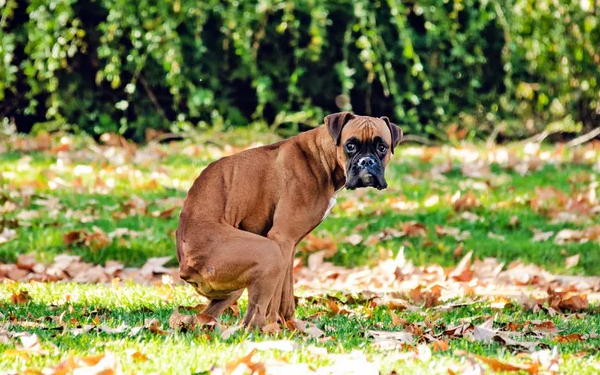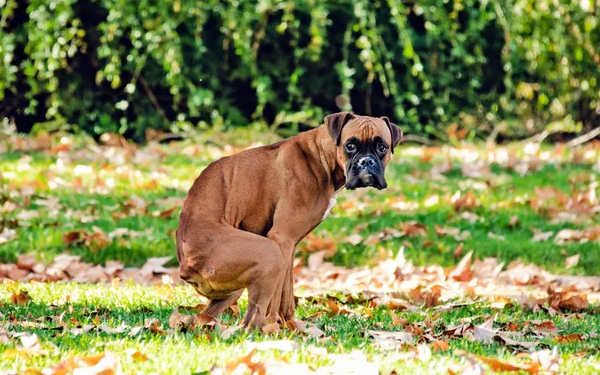It’s looking like 2021 might be even crappier than 2020. It might even be the crappiest year ever.
We are of course speaking in the most literal terms. With dog adoptions increasing during the height of the COVID-19 pandemic, more dogs in more American homes means more poop in yards, parks, trails, and war memorials.
“I think everyone has been issued a dog in the last year, and I’m here for it,” says Suzanne Overgaard, the owner of ScooperDude Pet Waste Removal in the Charlotte, N.C., area. These days, her trucks will fill up with 20–40 bags of poop, some weighing 40 pounds or more.
Daily Paws spoke with Overgaard and two other pet-waste removal pros who’ve seen large upturns in business during the past 18 months. The sheer volume of poo has left them looking for more staff and equipment, and each of them underscore why it’s so important to clean up after your dog, whether at home or on a walk.
“You can mow over it all day long, but it’s going to be there,” says Ernie Fierro, owner of Doo-B-Gone in Omaha, Neb.
So Much Poop
Here’s how much poop we’re talking about, roughly: According to 2018 statistics from the American Veterinary Medical Association, Americans own nearly 77 million dogs. Each dog, on average, will produce about 340 grams of feces each day, so American dogs will push out 26,180 tons daily, Wired reports. (The magazine then inspires a disgusting visual by reporting how the weight approximately equals that of the Statue of Liberty.)
Data—both in terms of adoptions and veterinarian visits—suggest that more dogs found homes during the first year of the pandemic than in 2019. And more dogs means more poop.
Take Terry Studer’s business, Pooper Scooper People Dog Waste Removal Services, which operates around the Des Moines, Iowa, metropolitan area. She tells Daily Paws that she saw about a 20 percent increase in business from spring 2020 to 2021, equalling about 420 customers per week. She’s relying on plenty of help from her daughter and it’s enough to have her considering the hiring of a bookkeeper.
“I haven’t had time to do my own yard,” she says.
Petiquette: Can I Ban Dogs from Peeing and Pooping in My Yard?
Overgaard says she’s seen more business for all the services ScooperDude offers: residential, apartment, and pet waste removal stations installed for homeowners’ associations. Her peers are going through the same issues, she says, looking to hire more staff and secure more equipment. She’s “busier than ever.”
Fierro has seen about a 20 percent increase in business, too. He’s out in the field picking up poop each day for his hundreds of customers in the Omaha area. He’d like to hire someone else to help him out, but it’s hard to find someone and then take the time to train them up. (Clean, comprehensive poo retrieval is not as easy as it seems, and you should think carefully before entrusting the task to your child or teenager—just ask my parents.)
“It’s crazy,” Fierro says.
He has another theory on why he’s so busy: People have decided they don’t want to pick up after their own dogs anymore. It makes sense when you think about patrolling your yard with a trowel in blazing heat or freezing cold. Children and teens stink at it. Plus, you might not have the right equipment to really get your yard clean.
Compare all that inconvenience with the ability to get someone to come out and do it for you—just once or regularly—thoroughly and on the semi-cheap, it’s almost silly to do it yourself, Fierro says. He wondered if people adopting dogs during the pandemic were so understandably focusing on the great parts of owning a dog rather than the messier tasks.
Those tasks, however, need doing.
Why It’s Important to Pick Up Your Dog’s Poop
It’s tempting to just ignore all the doggy dumps sitting in your backyard. Or to whistle and keep walking when poop happens on a trail. We get it, truly! Not everyone wants to deal with poop, but you need to pick it up for a variety of reasons.
First, it is not a fertilizer. You can compost dog poop, but that can take a long time. And even if you do have the time, you still have to pick it up before you add it to the compost pile. (Mowing over it doesn’t work, either!)
Dog Owners Are Obsessed with These Leak-Proof Waste Bags That Have 9,000 Five-Star Reviews on Amazon
Dog poop can also spread disease—Giardia and coccidiosis are particularly gross ones—and bacteria, especially if your dog has a penchant for sniffing or munching on the not-chocolate treats he finds. That’s how dogs can get sick, and it’s why you don’t want excess poop in your yard—or anywhere other people and pets might encounter it.
Your dog’s poop can also offer clues to your dog’s health or reveal where that missing jewelry or sock ended up. Studer looks for blood or anything out of the ordinary, making sure she lets the owner know if she sees anything suspicious in their dog’s waste.
Poo left lying around can hurt us humans, too. We can track the bacteria into our homes, and poop left out in the open can eventually make it into the local watershed, our primary sources of drinking water, Overgaard says. No thank you!
So: It’s time to grab that trowel and get to baggin’. You’ll want to double-bag your poop and then check with your local municipality on the best way to dispose of it. That might mean taking it to a pet waste station, putting it out for the garbage truck, or even flushing it down the toilet.
Or you can hire someone else to take care of all that for you. Plus, you’ll get your dog a new friend who visits weekly. (Poop aside, a job where you get to hang out with dogs each day sounds pretty sweet.)
“Poop is poop. It’s an interesting business to be in,” Overgaard says. “Somebody’s got to do it.”



